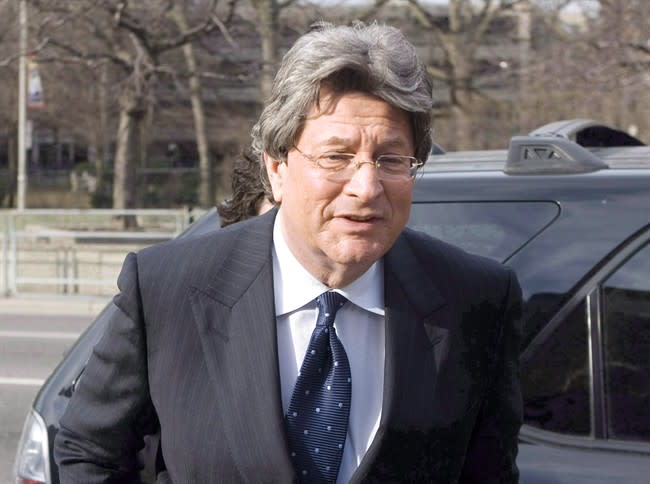 Daily Brew
Daily BrewOld habits die hard: Parole board unconvinced Drabinsky’s changed his ways

Garth Drabinsky once bestrode the Canada's entertainment industry like a colossus. He owned movie theatres, he produced movies and he brought major Broadway shows to the Canadian stage.
Now he's reduced to trying to convince a parole board to let him sleep in his own bed.
Drabinsky, 64, is on day parole and living at a Toronto halfway house after being convicted of fraud in 2009 along with partner Myron Gottlieb in connection with the collapse of their company, Livent Inc. He was sentenced to five years in prison (Gottlieb got six) and released after serving more than one-third of his sentence.
Drabinsky lost a bid Monday to be allowed to live at home with his wife. The Canadian Press reported the two-member parole board panel was split, which means a fresh hearing in two months following further evaluation of his risk to re-offend.
[ Related: Garth H. Drabinsky – Biography ]
The board gave no reasons for its decision but news reports from the four-hour hearing suggest the panel was concerned Drabinsky's work as an entertainment consultant was drawing him back into the kinds of activities that sent him to prison.
Drabinsky started out as a lawyer but began producing movies in the 1970s, the era of big government tax breaks intended to encourage domestic film production. That usually meant mediocre movies built around a Hollywood star. Drabinsky's production credits include the horror film The Changeling, starring George C. Scott, and the action flick The Amateur, with John Savage and Christopher Plummer.
Drabinsky co-founded the Cineplex Odeon movie-house chain, eventually expanding it to 1,800 screens in Canada and the United States. He was ousted by the company's board in the late 1980s over Cineplex's mounting debt and falling stock price.
But he rebounded, co-founding Live Entertainment Corp. with Gottlieb and staging major shows such as The Phantom of the Opera, Joseph and the Amazing Technicolor Dreamcoat, Kiss of the Spider Woman, a successful revival of Showboat and other crowd-pleasers. Livent helped boost Toronto's stature for live theatre and helped earn Drabinsky an Order of Canada.
Like Cineplex, Livent expanded quickly, buying or building theatres in Chicago, Toronto, Vancouver and New York. And like Cineplex, it also saw its debt swell, leading to a coup by shareholders that saw Drabinsky and Gottlieb turfed.
A U.S. investigation in the late 1990s resulted in charges they'd misappropriated millions from the company and falsified its books. But neither Drabinsky nor Gottlieb showed up for the case and they apparently still face arrest in the United States.
But the Livent founders were charged with multiple fraud counts in Canada, resulting in convictions and prison terms in 2011. He's been out on day parole since last February.
Livent investors ultimately lost about $500 million when Livent collapsed in 1998.
[ Related: Drabinsky fights to reclaim Order of Canada removed while in prison ]
Since being released on day parole, Drabinsky has worked for a company set up in the trust of his wife and children, according to parole board documents, CP reported.
"The concern that we have ... is some of what you're doing now is what you were doing before and we need to know if it's related to the offence cycle," said Louise Harris, the lead panel member.
The board cited a Correctional Service of Canada report from last June, which warned Drabinsky's ambition and determination to once again be an entertainment-industry player could tempt him to become involved in the management of certain kinds of projects, CP said.
Drabinsky testified his first consulting contract involved advising a company on advertising and marketing, while a second required him to assess film documentary projects under development. In that context, Drabinsky discovered a non-fiction book he said "cried out to be made" into a TV miniseries, so he helped acquire the rights to it, CP reported.
Drabinsky also has a deal with two companies, one in real estate, the other involved in theatre production, that are planning a partnership under his guidance, the Toronto Star reported.
Board member Louise Harris raised concern about the extent of Drabinsky's involvement in the newer ventures.
“If there has been a substantial shift, our concern is that what you are doing now is like what you were doing before [at Livent],” she said, according to the Star. “We need to know if it’s related to the offence cycle, so we can conduct a fair and accurate risk assessment.”
Fellow panelist Pauline Hodgkiss was more direct.
“I’m seeing a parallel universe [to Livent]," she said. "It causes me great concern. We feel you could be moving back into the kind of work you were doing before.”
But Drabinsky insisted the work is nothing like his chief executive position at Livent, he said. He is only a consultant and has no management authority or control over finances, the Globe and Mail reported.
The one-time impresario vowed to the parole board he'd steer clear of any scheme of the kind that lead to his downfall.
"There is nothing on this Earth to move me to do something that would affect my liberty ever again," he said. "I don't want to be involved and can't be involved in anything that even smells of impropriety."


